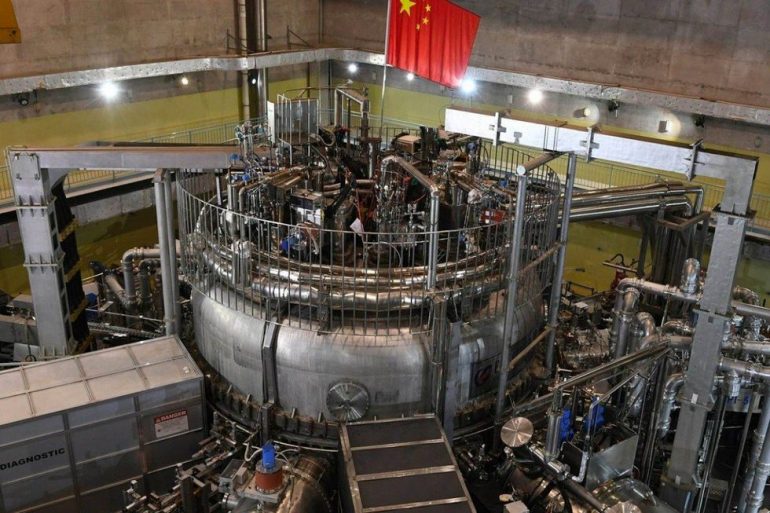af Helga Zepp-LaRouche

Billede: Kinas fusionskraft reaktor Tokamak HL-2M
Dec. 6 (EIRNS)—Her følger en engelsk oversættelse af Helga Zepp-LaRouches leder i den tyske avis Neue Solidarität, den 10. december 2020. (https://www.solidaritaet.com/neuesol/2020/50/hzl.htm)
The question that should preoccupy every thinking person, is how the international community can draw the lessons from the experience of Covid-19, and how we can ensure that we will never again be so unprepared for any new pandemic that could break out at any time. What we need to change, in order to overcome the underdevelopment and poverty that now threaten hundreds of millions of people with hunger and pandemics, should be an existential question for everyone.
A number of reasonable people, emphatically including economists, agree that many Asian countries were better able to contain the pandemic than the West, and acknowledge that China in particular managed to achieve a growth rate of 4.9% in the third quarter of 2020, while there was a decline of about 2% in the U.S. and 4% in European countries. The locomotive of the world economy clearly lies in Asia, especially since 15 Asian countries, representing roughly one-third of the world population and of global economic output, achieved a considerable breakthrough on Nov. 15 with the signing, after 8 years of negotiations, of the Regional Comprehensive Economic Partnership. The RCEP is a success for China in particular, insofar as U.S. Secretary of State Pompeo failed to persuade Asian countries to end cooperation with China.
Italian economist Michele Geraci, a former under-secretary in the Economics Ministry, immediately recognized and explained the economic advantages for European companies of investing, for example, in one partner country to the RCEP, and then being able to export at 0% duties to the 14 other RCEP signers in triangular trade. In that way, European companies can participate in the largest growth zone of the world. That applies emphatically, of course, to German companies, that depend on expanding markets. But that awareness has not yet sunk in, in Germany.
If someone talks hair-raising nonsense in a back room, that’s his business. But if someone does it in the pages of a daily newspaper, which influences the opinion of at least part of the population, it calls for a public commentary. The ideologically-driven ideas that Professor Thomas Straubhaar of Hamburg University spouts in Die Welt under the headline “China’s New World Order Endangers Germany’s Economic Model” clearly belong to the second category. This article could be used in any lecture as a demonstration of the inability of the reductionist method to arrive at the correct insight. He writes: “One by one, the individual pieces of Chinese policy come together in a coherent mosaic. The contours of a new world (economic) order are visible, one that is dictated and dominated by Beijing. What is becoming apparent should set off alarm bells in Germany.” https://www.welt.de/wirtschaft/article221738982/Handelspolitik-Chinas-neue-Weltordnung-gefaehrdet-Deutschlands-Geschaeftsmodell.html
What the Professor, whom we shall henceforth appropriately call Mr. Sträubhaar (i.e., “Hair-Raiser” — instead of Straubhaar), thinks he can deduce from the individual pieces, from the mosaic, is totally ahistorical and two-dimensional, located in a certain sense in Euclidean space. Therefore, the mosaic pieces are quickly transformed into “dominoes” in his article, such as Hong Kong, which he claims threatens to be the first to fall into Beijing’s hands. The historical background that Hong Kong was the spoils given to the British Empire as a result of the Opium Wars, and that forces of that Empire today, such as the Henry Jackson Society in London or the National Endowment for Democracy, have been quite blatantly involved in long-standing attempts to launch a color revolution in Hong Kong, such “contours” are not part of his “coherent mosaic.” But perhaps the Professor would get the point in terms of Taiwan, if Mrs. Merkel were not overjoyed to find out that Russia was, let’s say, delivering weapons to Bavaria, in order to equip the Alpen mountain troops for an armed conflict with the German Army?
“With its ‘Belt and Road Initiative,’ Beijing intends to create nothing less than a Eurasian economic space from the Yellow Sea on the east coast of China to the cliffs of the Atlantic Ocean in Europe, which also radiates out to Africa.” There you have it: the ultimate crime! China dares to do what Leibniz had proposed back in the 17th century, namely, that the two civilizations on the far ends of Eurasia, Europe and China, develop the region that lies between them! An economic space, which encompasses all of Eurasia, and even “radiates” to Africa would, he writes, “hit the core of the German economic model and destroy it.” But not if the German economic model consists of promoting growing markets and ever-richer customers! But if it only consists of protecting the transactions of the Wirecard company over the years, then, investments in infrastructure projects are indeed a huge danger, because they tie up for so long so much attractive liquidity, which could otherwise be put to splendid use in speculation!
The fact is that China, with its infrastructure investments in Africa and other parts of the developing sector, is not only pursuing its own interests, but also giving these countries for the first time the chance to shake off the legacy of the colonial era. Instead of actually lifting Africa out of poverty through investments, the European Union would evidently rather use Frontex (border guards) to carry out so-called “pushback operations,” to repel the refugees attempting to cross the Mediterranean into Europe, for which staff members are now on trial.
The German business model is not threatened by China’s focus on innovation, but by the EU’s self-destructive ideology of the Green Deal, which forces high-tech industrial sectors, that require high energy flux densities in order to produce, to convert to costly alternatives. China is investing in nuclear energy, particularly in fusion energy, and has just completed the installation of the HL-2M Tokamak fusion reactor in Chengdu, and can now begin with the testing of all systems and components. But Germany is squandering its research capabilities on whatever is “green,” and therefore lowers productivity.
Finally, Professor Sträubhaar writes: “If the Chinese mosaic is decoded [he obviously can’t escape his reductionist way of thinking], what is exposed is the definitive end of an American world economic order, that remained valid for over 70 years, and provided Europe, and especially Germany, with an economic success never thought possible.” The idea that the rise of China automatically means the decline of America could only occur to someone who sees the world as a zero-sum game. So he is left with the only desperate alternative of having to choose one or the other side, and thus either treat China as an arch-enemy or lose the U.S. military protective shield.
However, there is a much more optimistic perspective than that of geopolitical confrontation, which inevitably leads to the Thucydides trap, and thus, in the age of thermonuclear weapons, to the destruction of mankind. The fact that the neo-liberal model has left the health system of the West so unprepared for the pandemic, while China and other Asian countries handled it much better, could lead us to the conclusion that we have something to learn from China and Asia. After all, China has just achieved its goal of overcoming extreme poverty in the entire country by 2020.
We, in Germany and in the other European nations, could do away with the “green” dictatorship of the EU bureaucracy, apply once again the original German business model, that was based on scientific and technological progress, and accept China’s offer to cooperate with the New Silk Road initiative in the industrialization of Africa, South-West Asia and the Balkans. That would create the preconditions for hundreds of millions of potential refugees to contribute to building their own countries rather than risking their lives by fleeing. It would also create growing markets of several billion people with increasing purchasing power, which would in turn offer long-term prospects for the German economy.
Although Europeans have a distorted view of the situation because of the lock-step reporting by mainstream media, it is not to be ruled out that a genuine citizens movement will prevail in the United States and defend the Constitution and the U.S. Republic against the machinations of the military-industrial complex. In that case, the current anti-Chinese hate campaign would be replaced by the realization that cooperation among the world’s two largest economies is not only in the interest of the United States and China, but is also necessary to avert the “worst humanitarian crisis since the founding of the United Nations” and the acute starvation facing 270 million people, as the head of the World Food Program David Beasely has warned. It is only by working together that we will be able to overcome the existential problems of mankind, such as hunger, poverty, pandemics, energy and raw materials security, earthquake warning systems and anti-asteroid defense, just to name a few. And that is in the interest of our entire species.
We as a species are distinct from all other living beings in that our entire existence proves that we have always been able to discover creative solutions to seemingly hopeless conflicts, because we are able to think on the level of reason. This also means that our species can be trusted to establish a future order of economic, political and cultural coexistence that allows us to focus on the common aims of mankind rather than wasting resources on wars and other Aristotelian forms of trench warfare.
Billede: Tokamak_HL 2M Mlcumi, CC BY SA 4.0.jpg Wikipedia Commons.







